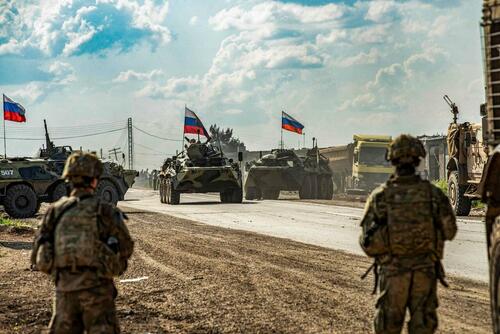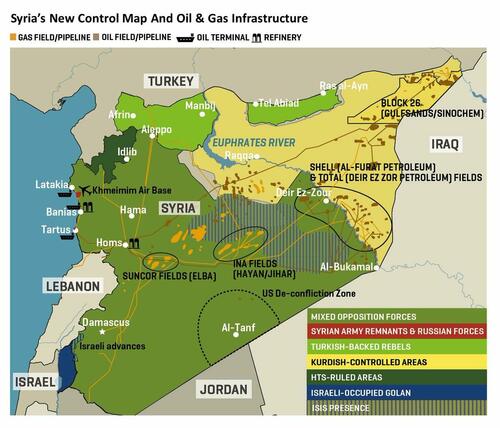On Monday the Kremlin disclosed that the fate of its military bases in Syria remains unclear and undecided, following the collapse of the Syrian government and Assad having fled the country on December 8.
"There are no final decisions on this," Kremlin spokesman Dmitry Peskov told a press briefing. "We are in contact with representatives of the forces that now control the situation in the country."

Likely Moscow is pressing representatives of Hayat Tahrir al-Sham (HTS), which holds Damascus, to at least temporarily give assent to the continued Russian military presence on the coast.
The Tartus Naval Base remains Russia's only Mediterranean military port. And alongside Khmeimim Air Base, these are the only two major Russian military outposts outside the former Soviet Union.
They are strategic and crucial for Russia's operations in the Middle East and North Africa, and a full closure of these bases would be a logistical blow in the region for Moscow. It would also signal Russia's waning influence in the Middle East, also at a moment the Pentagon continues occupying Syria's northeast.
Moscow has been busy evacuating both diplomatic staff and some military assets from Syria, as Maxar satellite photos show.
Since the HTS takeover of Damascus there have been no reported incidents of Russian troops or the bases coming under fire; however, Moscow forces are on high alert.
The last several days have seen huge Russian armored and troop convoys withdrawing from the capital area and some other parts of Syria, headed to the safety of Hmeimim airbase in Latakia province. Assets like anti-air defense missiles are being flown out, and will likely be repositioned related to the war in Ukraine.
Who controls the oil and gas infrastructure in Syria after the fall of Assad (via @MeesEnergy)
Several videos have emerged showing significant amounts of Russian equipment being moved to the coast. Negotiations with the new leaders in Damascus for Russia's bases to be maintained appear to be ongoing.
Washington is likely to press the powers that be in Damascus to force a Russian military exit from the country. And certainly HTS leaders themselves are not going to trust Moscow, given that it was Russian forces for years bombing its enclave of Idlib in support of the Syrian Army.
On Monday the Kremlin disclosed that the fate of its military bases in Syria remains unclear and undecided, following the collapse of the Syrian government and Assad having fled the country on December 8.
"There are no final decisions on this," Kremlin spokesman Dmitry Peskov told a press briefing. "We are in contact with representatives of the forces that now control the situation in the country."

Likely Moscow is pressing representatives of Hayat Tahrir al-Sham (HTS), which holds Damascus, to at least temporarily give assent to the continued Russian military presence on the coast.
The Tartus Naval Base remains Russia's only Mediterranean military port. And alongside Khmeimim Air Base, these are the only two major Russian military outposts outside the former Soviet Union.
They are strategic and crucial for Russia's operations in the Middle East and North Africa, and a full closure of these bases would be a logistical blow in the region for Moscow. It would also signal Russia's waning influence in the Middle East, also at a moment the Pentagon continues occupying Syria's northeast.
Moscow has been busy evacuating both diplomatic staff and some military assets from Syria, as Maxar satellite photos show.
Since the HTS takeover of Damascus there have been no reported incidents of Russian troops or the bases coming under fire; however, Moscow forces are on high alert.
The last several days have seen huge Russian armored and troop convoys withdrawing from the capital area and some other parts of Syria, headed to the safety of Hmeimim airbase in Latakia province. Assets like anti-air defense missiles are being flown out, and will likely be repositioned related to the war in Ukraine.
Who controls the oil and gas infrastructure in Syria after the fall of Assad (via @MeesEnergy)
Several videos have emerged showing significant amounts of Russian equipment being moved to the coast. Negotiations with the new leaders in Damascus for Russia's bases to be maintained appear to be ongoing.
Washington is likely to press the powers that be in Damascus to force a Russian military exit from the country. And certainly HTS leaders themselves are not going to trust Moscow, given that it was Russian forces for years bombing its enclave of Idlib in support of the Syrian Army.

